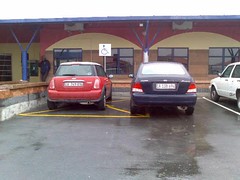Wednesday 28 February 2007
Friday 23 February 2007
Yet another example of accessible parking bay abuse
Posted by
Guy
at
23:45
0
comments
![]()
Labels: Accessible Parking Bay Abuse, Moblog
When is an Access Auditor not an access Auditor?
I know that in most countries still there are few accreditation procedures for Access Auditors. The National Register of Access Consultants in the UK springs to mind. But even there, membership is not mandatory.
But I know of several people who are putting themselves about as Access Consultants, or even worse; Universal Design Consultants who, other than personal experience of a disability have really no idea of what they ane talking about. Of course, that was how I ended up in this business. But I soon realized that there was a lot more to this than I thought. So I got myself some training at the Centre for Accessible Environments in London. Unfortunately, there is nothing equivalent here. But it seems that many people are happy to continue without any formal training. Some of them might be doing excellent jobs; but from what I have seen and heard of others, I am concerned as not only are they basically scamming people, they are also doing an injustice to the people with disabilities who may end up trying to use facilities that they have "audited". They are also potentially damaging to the profession, as companies will say." well we spent a load of money on access but there disabled people are still complaining."
I don't know what the answer is. I just wish that people were a bit move ethical about how they conduct themselves.
Posted by
Guy
at
18:41
0
comments
![]()
Labels: Access, Inclusive Design
More accessible parking bay abuse
Posted by
Guy
at
14:02
0
comments
![]()
Labels: Accessible Parking Bay Abuse, Moblog
Thursday 22 February 2007
Lifeblog post
Posted by
Guy
at
20:44
0
comments
![]()
Labels: Accessible Parking Bay Abuse, Moblog
Every little helps...
...said the ant pissing into the ocean.
I don't usually join mass mailings or sign petitions, etc. As I honestly doubt that they have much effect.
But I did put my name to this; we need to somehow register our abhorrance of the injustice of Gautanamo Bay. Please visit http://amnesty.textdriven.com/guantanamo/home/ and register yout support.
Posted by
Guy
at
18:25
0
comments
![]()
Labels: Links
The Skeptics' Guide To The Universe
This is a particularly good podcast that I try to listen to. I am (as I have said before) at how guillible the general public is. This podcast is quite humourous, but it also does a good job in de-bunking some of the popular myths that the general media seem to love to build up.
The Skeptics' Guide To The Universe: "Our Podcast Feed link: http://www.theskepticsguide.org/rss.xml
"
Posted by
Guy
at
16:28
0
comments
![]()
Freedom of Expression Institute - FXI launches Icasa complaint against SABC
Freedom of Expression Institute - FXI launches Icasa complaint against SABC: "20 February 2007
FXI complains: SABC has violated licence conditions and Broadcasting Act
The Freedom of Expression Institute (FXI) today laid a complaint with the Complaints and Compliance Committee (CCC) of the Independent Communications Authority of South Africa (Icasa), about the South African Broadcasting Corporation."
Posted by
Guy
at
16:23
0
comments
![]()
dissol's moblog
dissol's moblog: "Another example of Parking Bay abuse
Another example of Parking Bay abuse
larger
(viewed 13 times)
This was outside the dept of Social Services. The vehicle belongs to Social Services! GVX537G
- Taken at 1:11 PM on February 22, 2007 "
Posted by
Guy
at
16:21
0
comments
![]()
Thursday 15 February 2007
Approach to Design Issues
I particularly like this approach to design, I think I picked it up from CABE - but I must check that. It sort of sums up how we should approach design issues very neatly.
Although the academic and broadsheet worlds still tend to refer to ‘the elderly’ and ‘the disabled’, as if they form distinct groups outside the mainstream of society, there is a growing trend to recognise age and disability as something we will all experience, and therefore part of a normal lifecourse. Disabled people have become increasingly assertive about their rights to access buildings and services, while for older people the emphasis is now on independence. Both groups aspire to active participation within the mainstream of society, reject the dependency and institutionalisation that were the norm for much of the last century, and are beginning to assert themselves as consumersI therefore get quite annoyed with the prevalence worldwide, and possibly more so here in South Africa, of the Disability Sector trouncing out the "nothing for us, without us" quote that has been hijacked from the civil rights movement. Of course as in a previous post, the design has to be inclusionary and the process of design has to be participative. But throw away lines, like the above, only perpetuates the "us & them" mentality. There is no "us & them" - we are them, and they are us (or could be one day!). We are designing for society, for everyone. Everyone is involved in this. Many times, in Internet debates I have pushed certain aspects (some may even call me opinionated!), and these have been ignored or devalued by other people in the debate...until they find out that I am a wheelchair user. It does not make any difference! My view should carry the same weight! Sure my disability opened my eyes to these issues, but that was only because I was blind beforehand. Most of the people on my Masters course appear not to be disabled, but does that lessen their input or views? Of course not! I really feel that until the Disability Sector can move away from this viewpoint we will continue to be hamstrung here. As an interesting point; I have noticed that people seem to pay more attention during a 'combined' workshop when my business partner, Jeremy, (who happens to be blind) talks about wheelchair access, and then I (who happens to be a wheelchair user) talks about deaf issues.
who control significant amounts of disposable income. Such new expectations offer a rationale for design that is ‘inclusive’ rather that exclusive, and more closely aligned to contemporary social expectations.
Why shouldn't we? We have both done a lot of work in the Disability field, and have something to offer. Just because our own impairment does not match the subject heading has no effect on the validity of our comments.
Posted by
Guy
at
11:41
2
comments
![]()
Labels: Access, Inclusive Design, Terminology
Inclusive Design Features
I am not sure if this will translate well on a blog, but the list below should explain what the features of an Inclusive Environment is as compared to a non inclusive environment.
Inclusive Design Non-inclusive Design
Concern with meaning & context Concern with style & ornament
Participative Non participative or exclusionary
Human orientated Corporate or institution orientated
Client re-defined to include others Owner as exclusive client
Low cost High Cost
Grassroots design approaches Top down design approach
Democratic Authoritarian
Seeking to change design attitudes Acceptance of prevailing design principles
Use of appropriate technology Use of high technology
Use of alternate models of the development process / Development process controlled by corporate interests
Heterogeneity Homogeneity
I hope that it all makes sense? Inclusive design is a fascinating field, and as we unpack the various features, we begin to see how all pervasive the elements of Inclusive Design are, and how they effect all aspects of the building. One feature that many designers and planners seem to have issues with is the cost factor. Many will try to argue that designing something accessible (they are thinking of all the lifts and ramps they have to build in addition to the usual) is always going to cost more. I disagree (very unusually for me), and try to explain. Sure; I can see that in some cases the initial design & build costs can be higher, as the process calls for more input from a wider pool of knowledge, and this can have an impact on timings too. But by building and inclusive design from the outset avoids having to make expensive adaptations later on, it allows more people to use the facility in a safe manner. It should also be attractive and pleasant to use. I am sure that we have all been into houses, or even offices that are just unpleasant to be in because of the built environment. We then choose to try to avoid re-visiting. So immediatly the pool of occupants, visitors, clients, stakeholders is reducing. We should also be designing for the future; many societies are aging - we are learning to live longer. Something like 30% of all 55 - 65 year olds may be viewed as being disabled. Surely we don't want to design facilities that will exclude them? In fact I would suggest that most of us (once we have got out of the teenager "only the good die young" / immortality stage) actually want to be part of an elderly population...sure in our wishes we will all be fit 100 year olds, that eventually die by being shot by a jealous husband / wife as we climb out of the window! But in reality, we will find that certain abilities will degrade with age. It may be that our sight begins to fade, or we find that people are all beginning to speak to softly. Or our hips / knees / whatever creak a little. Hey presto! Welcome to the club! But if all our environments are built to be "future-proof" and to allow for these changes, without adaptations then the overall costs come down.
There is no point always designing really expensive facilities, as few people can afford them.
OK, I will expand on some other issues around this later on. Please feel free to comment!
Posted by
Guy
at
11:16
0
comments
![]()
Labels: Access, Inclusive Design
Inclusive Design
Although I am nearly finished with my studies to obtain an MSc in Accessibility & Inclusive Design, I still find Inclusive Design such an interesting subject and I am learning new things about it all the time!
In concept it is very easy. There are 7 basic tenets or principles to Inclusive (or Universal...although there are some differences) Design:
- Simple and intuitive use.
- Equitable use.
- Perceptible information.
- Tolerance for error.
- Flexibility in use.
- Low physical Effort.
- Size and space for approach and use.
So now I am preparing a workshop to explain these really basic principles to a concept design team. They may (or more likely) may not have heard of Inclusive Design and may, or may not have a grasp on what this means to their areas of expertise. The difficulty is pitching the presentation just right. These are simple concepts and ideas, and they are all educated, professional people. I don't want to appear to be talking down to them, or worse, suggesting that they should have already realised this already...
What I may do is post some of my slides here, for comment. I obviously don't want to on the one hand be paid to give this workshop to professionals, and on the other hand give this all away free on the Internet... I doubt I would get too much future business if I always did that. But in reality, this is not rocket science. As long as you keep the concepts above in mind, everything else falls into place.
Posted by
Guy
at
10:03
0
comments
![]()
Labels: Access, Inclusive Design
Wednesday 14 February 2007
Quackwatch Mission Statement
Continuing on from my last post; this is another really useful site which exposes the many fraudsters and snake oil peddlers that inhabit the internet. While the internet does provide the platform for may fraudsters to sell their wares, it also (if you are prepared to look!) also provides some useful counterbalance to all these different claims. My business used to be selling herbs, (although the majority to pharmceutical companies, who would extract specific active ingredients for use in various medicines), and therefore I am aware of some of the 'useful' ingredients of certain specific herbs.
But the experience from their also provided me with an insight into certain dubious claims, and actions of a variety of different companies, who produce all manner of different substances, with all manner of weird and wonderful claims. I hope that sites like the one below, will educate people, so they can make informed decisions about certain claims. I am not for a moment proposing that I agree 100% with everything that is written on this site...but I do believe it does give me some useful FACTS and information that I use to decide the "Bullshit Rating" of what I read or am told elsewhere.
Mission Statement: "Quackwatch, Inc., which was a member of Consumer Federation of America from 1973 through 2003, is a nonprofit corporation whose purpose is to combat health-related frauds, myths, fads, fallacies, and misconduct. Its primary focus is on quackery-related information that is difficult or impossible to get elsewhere. Founded by Dr. Stephen Barrett in 1969 as the Lehigh Valley Committee Against Health Fraud, it was incorporated in 1970. In 1997, it assumed its current name and began developing a worldwide network of volunteers and expert advisors. Our activities include:
- Investigating questionable claims
- Answering inquiries about products and services
- Advising quackery victims
- Distributing reliable publications
- Debuking pseudoscientific claims
- Reporting illegal marketing
- Assisting or generating consumer-protection lawsuits
- Improving the quality of health information on the Internet
- Attacking misleading advertising on the Internet"
Things I love about the Internet
I know, I know; the Internet is frustrating, full of porn and snake oil. Probably 95% of it needs to be assigned to the bin.
BUT...it does allow a person to dig behind a story. It not only gives a platform to the snake oil peddlers, it also gives a platform to people who wish to expose the snake oil sellers.
I trawl all over the net; and often am disappointed with what I find, but sometimes you come across gems, that make it all worthwhile.
I will try to give a few as time goes by.
One that I recently found (although this is by no means new news!) is the James Randi site (http://www.randi.org/). Now Mr Randi, like me, is a sceptic. I probably have become more sceptical since becoming paraplegic, as so many people have offered me 'miracle cures' and the like.
I must admit that I become quite incensed when mainstream media (TV & radio) allows so much airtime to assorted quacks and mystics and all that nonsense. There is one local radio show, Cape Talk, where the afternoon presenter, in a vain effort to be hip, cool, & trendy has all sorts of mystics and the like on her show. I do try to listen, and even phone in, but rarely if ever get through (strangely I often do get through on other shows, when I am agreeing with a guest, or adding to the debate)...
Anyway, back to Mr Randi. He has a Million Dollar Challenge; which is aimed at all anyone selling the paranormal, pseudoscience, & the super natural. He offers to pay a million dollars to anyone who can prove their 'powers' in a mutually agreed test. Quite simple! He does not set the requirements - but they are agreed between the 2 parties. If they manage to do whatever they claim that they can do then they would walk away one million dollars richer! He even has a 'clock' on his site recording the weeks - currently at 285 weeks since the 'great' 'psychic' (both in inverted commas as I don't believe either title!) Sylvia Browne admitted on the Larry King show that she would take the test. To date she hasn't! Many have actually tried...and to date not a single one has managed to even pass the preliminary test!!
Why is the general public so gullible? I really like a good magician, and I enjoy trying to work out how he did his 'magic'. But I really cannot stand people who use slight of hand, or basic human psychology and start claiming mystical powers, and the like. They are selling snake oil!
I shall reserve my feelings and opinions on other forms of snake oil (homeopathy, faith healing, and the like for another post. I try not to be cynical about any claim, but rather view any claim like this; "Great, that is wonderful if it works as you say, now prove it to me please?"
Posted by
Guy
at
09:44
0
comments
![]()
Pythonline > Plugs > Idlewild > About The Editor
This is a wonderful link & song; Eric Idle recorded the song in early 2004 in reaction to a fine by the U.S. Federal Communications Commission (FCC) for saying "fuck" on a Clear Channel radio station. The song is also known by its refrain "fuck you very much". Despite being aimed at the FCC, the lyrics primarily target well-known figures associated with the George W. Bush administration. Typically Pythonesque they also make the dowload available as a free download - follow the link.
Pythonline > Plugs > Idlewild > About The Editor: "Eric Idle presents... The FCC Song.
'Here’s a little song I wrote the other day while I was out duck hunting with a judge… It’s a new song, it’s dedicated to the FCC and if they broadcast it, it will cost a quarter of a million dollars.'
Download Here (3.1MB)"
Posted by
Guy
at
09:34
0
comments
![]()
Labels: Links
Why Access Audits cannot be done over the phone
I am often asked to conduct a light-weight audit (usually by clients who have just had sight of a proposal!!).
I say "Sure! Which impairments shall I exclude for you?"
Think about it...if we exclude say wheelchair users...then life would be much simpler?
Only 4% of disabled people own a wheelchair.
So if we get it right for everyone else...then we can claim to be 96% accessible?
Now when I was at school, 96% was a pass...a heck of a good pass!
But obviously that would be barmy in an access situation.
It would be like claiming to be a 96% virgin! ("Well, I have only had 4% of the sex that I hope to have in my lifetime!").
Doing an audit over the phone never works. Let me give you a recent example; I was conducting an audit on a facility which had 2 storeys. I asked what was upstairs, to be told that it was only offices, and if a visitor came (or they had an employee) who could not get up the stairs, then an office can be made available downstairs. I asked for confirmation - is it only offices? Yes. But curiosity never killed any cat I know, so I decided to "bum shuffle" up the stairs and have a look. It was worth the effort (and dirty trousers!). I found an incredible resource (free computer training), which had been 'forgotten' by the 2 managers that I asked. I also found Boardrooms and a heck of a lot more space (the ground floor was incredibly crowded). Now there was no malicious intent when I was misinformed. The people genuinely forgot! The same happens often when I phone hotels & restaurants for my own private use. I wish I had a penny for every step that was missed or narrow doorway that was overlooked. I have even seen it happen with my own eyes; I was lecturing a some students on Access issues, and part of the process was a 'live' audit. They were very precise when measuring the accessible parking bay...but totally 'missed' the fact that there was no kerb cut out, so anyone in a wheelchair could get out of the car, but then could not get to the building as there was a kerb in the way. Each student must have stepped up & down half a dozen times as they made sure of the measurements. Personally I find the lack of cut outs mush more inaccessible than a bay that is a centimetre too narrow! When we got back to the classroom and I raised the issue, none of the students would believe me, and we had to go back outside to prove the point.
Now I am certainly not saying that you have to be a wheelchair user to be an access consultant. It does help at times - a wheelchair rider would not have missed the lacking cut out. But, bum-shuffling up a couple of flights of stairs is not ideal either!
Posted by
Guy
at
09:11
0
comments
![]()
Labels: Access













